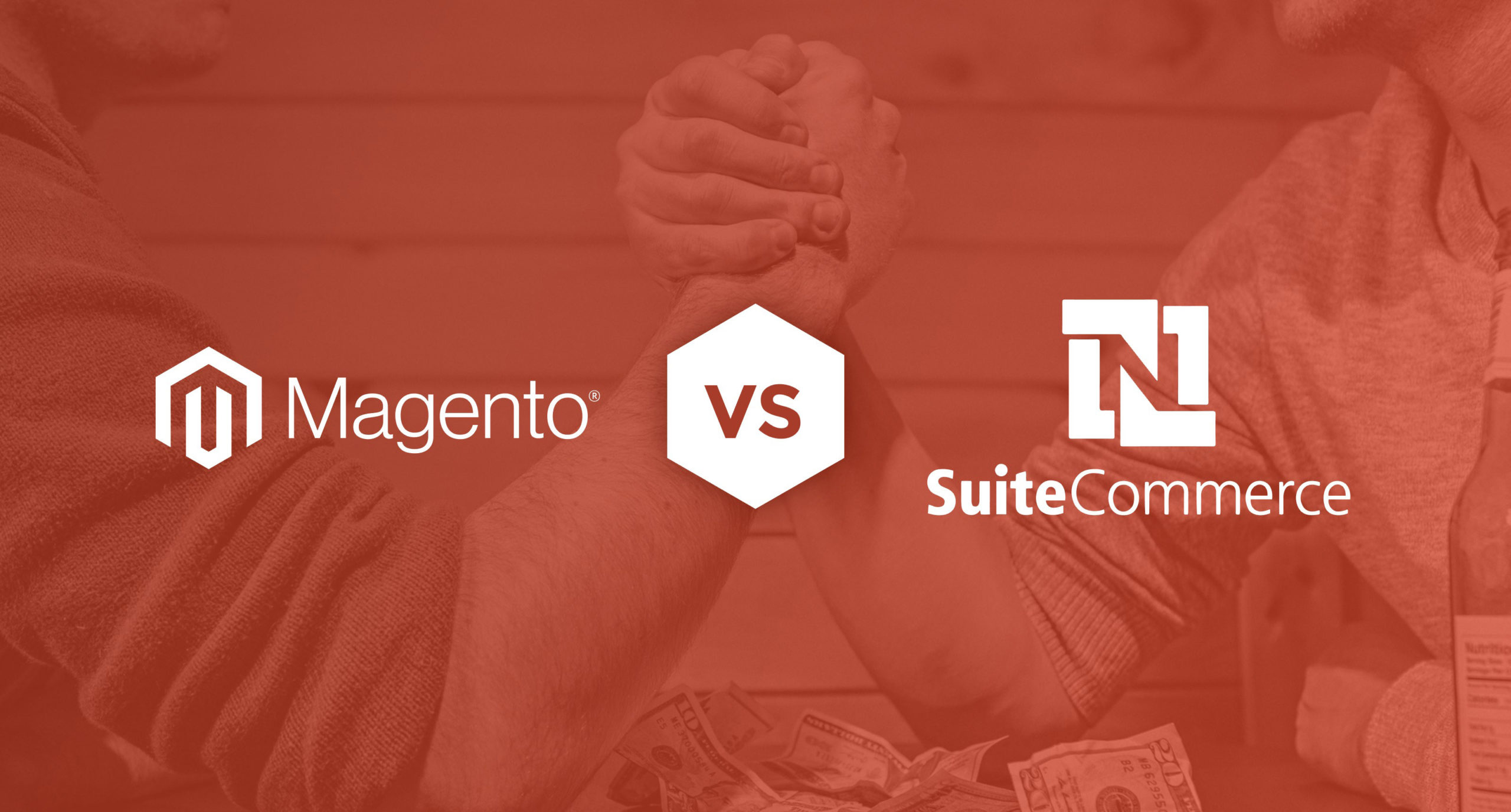Even after using one platform for years, businesses are constantly looking for ways to improve their efficiency and optimize their eCommerce flows. With the end of life of Magento 2.3.X looming, a lot of companies are beginning to wonder if they should upgrade to Magento 2.4 or switch to another platform altogether. There’s some tough competition out there among the eCommerce heavyweights and Oracle’s NetSuite SuiteCommerce stands out.
In the Magento vs. SuiteCommerce battle, there are a lot of factors to consider before choosing who to side with. We’ll go into 7 things you should know before backing one over the other.
Let’s jump right into the ring!
1. Magento vs. Suite Commerce Pricing
We’ll start off with the big question you’re already asking: how much would each of these cost me?
We’ll start off with the easy one: SuiteCommerce. This one is a modular based model and then every feature after that adds up. For example, navigation would be an additional cost after the base price.
Whereas, Magento, whether it’s Magento Open Source or Magento Commerce is an all-inclusive price.
We highly recommend Magento Commerce, which is the cloud-based version of the same software that provides a lot more support and improved CMS interface. With the recent upgrade to version 2.4, many new features were introduced and usability was improved quite significantly. So really the price of the platform depends on how successful you are.
Between the license fee and development costs, you would end up spending more with SuiteCommerce since every feature is added into the cost as you go through the development process.
2. Comparing Magento and SuiteCommerce’s Scalability
Both platforms are targeted towards large, enterprise-sized companies. This means they are well-equipped to handle high volumes on the websites.
But scalability isn’t only about traffic and website speed on the front-end either. Sure, this is what your customers are going to be seeing at first and interacting with, so it’s definitely important, but you need to ensure that the back-end can keep up as well.
As the number of orders grows, you will have a much higher load on your transactions, payment processing, inventory management, shipping, return processing, and tons of other bits related to eCommerce. This is where Magento excels.
SuiteCommerce isn’t known for its scalability capabilities. The system was built in the 1990’s and is simply old-technology making it difficult for the system to keep up with modern technology. The architecture is not designed to scale, it’s built for the most basic retail sites. If you’ve got a lot of complex configurations, it breaks easily. Most SuiteCommerce users notice how extra add-ons slow down the processing and make it a bulkier option.
With Magento you don’t have to worry about having all sorts of extraneous menu options and icons on your interface. This ensures your users are efficient and able to keep up with a growing number of orders.
3. Which Platform Has More Features?
When you’re running an eCommerce platform, things often get more and more complex as your business grows. In order to support this complexity you need a platform that has a wide array of available features to choose from. Of course, you’re not going to need each one of those available, but it’s good to have them as an option should your needs change over time.

As you can see, there are quite a lot of features missing from SuiteCommerce when compared to Magento. Something to really consider about SuiteCommerce is that It is not SEO friendly. From how the site and code is structured to making it pass Google Page Speed insight tests, your site will be impacted in one way or the other on SuiteCommerce.
On SuiteCommerce, you can either do things, or you can’t, as it’s a SaaS solution lacking flexibility. The customization layer is weak and is known to break a lot and upgrades consistently damage customer customizations which defeat one of the main purposes.
The beauty of Magento is that any features not available already on the platform can be easily integrated to your own bespoke setup. There are countless extensions available that you can have your developer install into the platform to make it do everything you could possibly need from your eCommerce system!
4. Does SuiteCommerce or Magento Have a Larger User Base?
250,000 vs. 40,000. That’s the current Magento vs. SuiteCommerce score. SuiteCommerce simply doesn’t have the reach the Magento does, which also means a significantly lower number of active users.
A smaller user base can translate to more difficulties with troubleshooting problems. For example, if you get an error message on your iPhone and Google it, you’re going to see hundreds if not thousands of people asking about the same issue and likely dozens of responses on solving the issue. If you have, say a Meizu phone, you will likely find very few answers to your query.
The same applies in the Magento vs. SuiteCommerce battle. You don’t want to be the team with the machete hacking through the rainforest first—you want a nicely paved path. Being the first to encounter a specific issue will slow down your workflow and likely cost you money in lost work hours.
Magento is the leading platform among the top 10k sites, in all geographic areas, and among all website categories. No matter where you match them up, Magento is reigning supreme in all arenas right now.
5. Comparing Support Options for SuiteCommerce and Magento
You’re likely going to have an external agency set you up with either system and make sure everything is working properly at the start. That’s great, but what happens when something goes wrong six months down the road?
With SuiteCommerce, there is absolutely no support and there are no developers. This makes it difficult because the user experience and admin can be hard to navigate. On the other hand, Magento has 24/7 phone hotlines, live chat, and email support available for any issues you may encounter with their platforms.
Sure, user forums and community are a great place for quick fixes, but you’re going to want to have access to the customer service experts at the companies themselves for the big stuff.
But Magento takes it a step further. When you get set up with their platform, you get a dedicated Technical Account Manager (TAM) who is going to be familiar with your unique setup. Each company is different and will have a specific Magento architecture. Having one person regularly working with your company will make the troubleshooting process so much easier that just working with general support. We all know how tickets, email threads and multiple agents can make things more confusing in some cases!
6. Comparing the User Experience
The users are both your customers and your employees when it comes to an eCommerce platform. So really, you’re looking at two separate interfaces and how easy they are to use: front end and back end. Both Magento and SuiteCommerce have great libraries of templates for you to choose from and make the front end look and act the way you want. However, when the templates are lacking something you need, Magento offers more flexibility for integration with third-party extensions or customization in the codebase itself.
Regarding the backend usability, what you and your team will be working with, SuiteCommerce is out-of-the-box ready to go and can be easier to set up. However, it will likely have a lot of features that you won’t need to use and will clutter your menus and interface. This will mean spending extra time to clear out these features or more difficulties in navigating the platform.
With Magento, you do have to take some extra time to set it up and likely bring on an external agency to develop it for you. The agency will be able to set you up with a customized panel that suits your needs perfectly and also train up your team on how to make the most of all the great features.
7. Does Magento or SuiteCommerce Have More Integrations?
Are you already using SuiteCommerce? Well the good news is that switching over the Magento means you can still stay with NetSuite. You can use Magento to manage your eCommerce, while seamlessly syncing with NetSuite for your inventory, orders, promotions, rewards, and CMS information. The NetSuite SmartConnector lets you integrate your ERP with Magento and streamline your order fulfillment by marrying the two.
You’ll be able to support a higher volume, quickly and efficiently. This means your customers will get their orders faster and be happier. Happy customers mean more money for you in the long run!
Summary
So have you decided who wins the Magento vs. SuiteCommerce fight? It’s ultimately going to depend on your business needs. If you need a lot of features and a robust support system with tons of experience, your best bet is going to be Magento.



Leave a Reply
You must be logged in to post a comment.